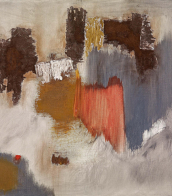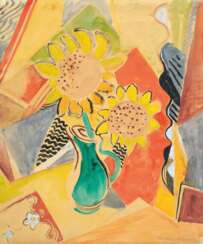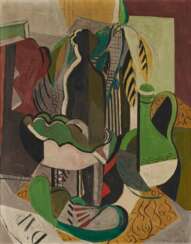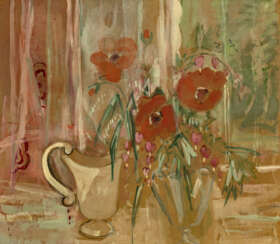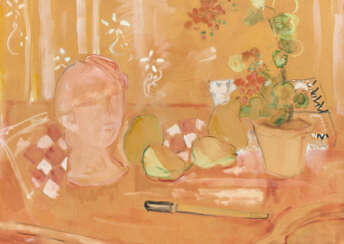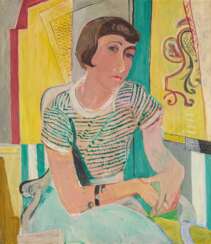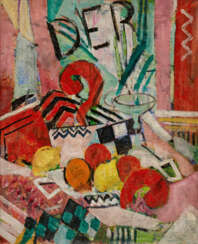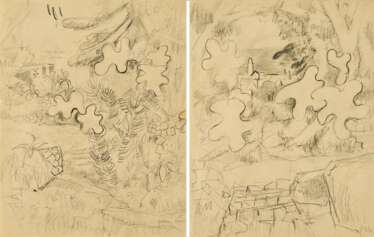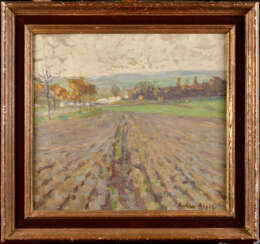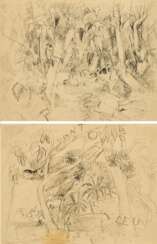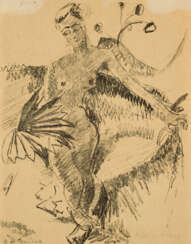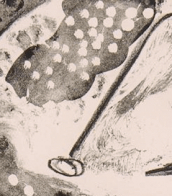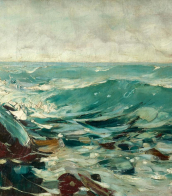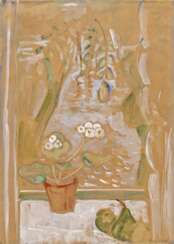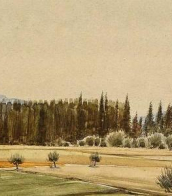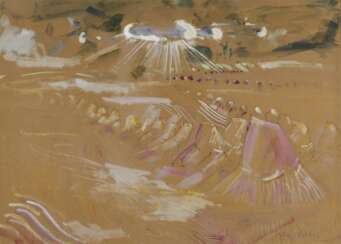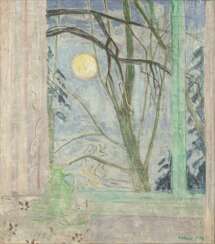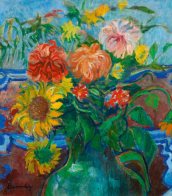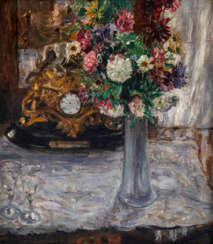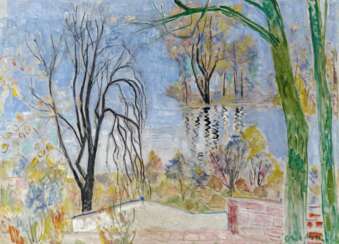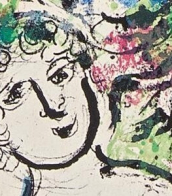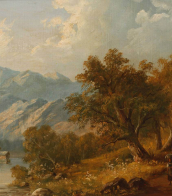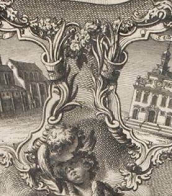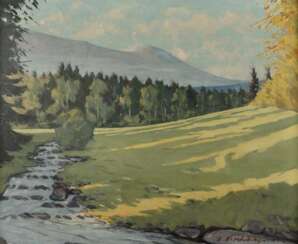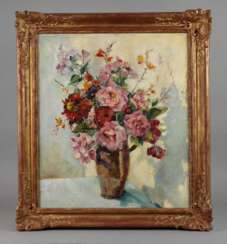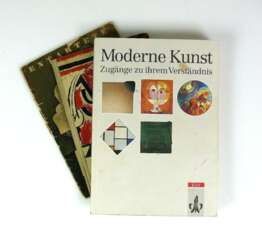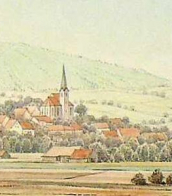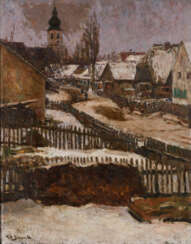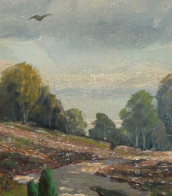oskar moll
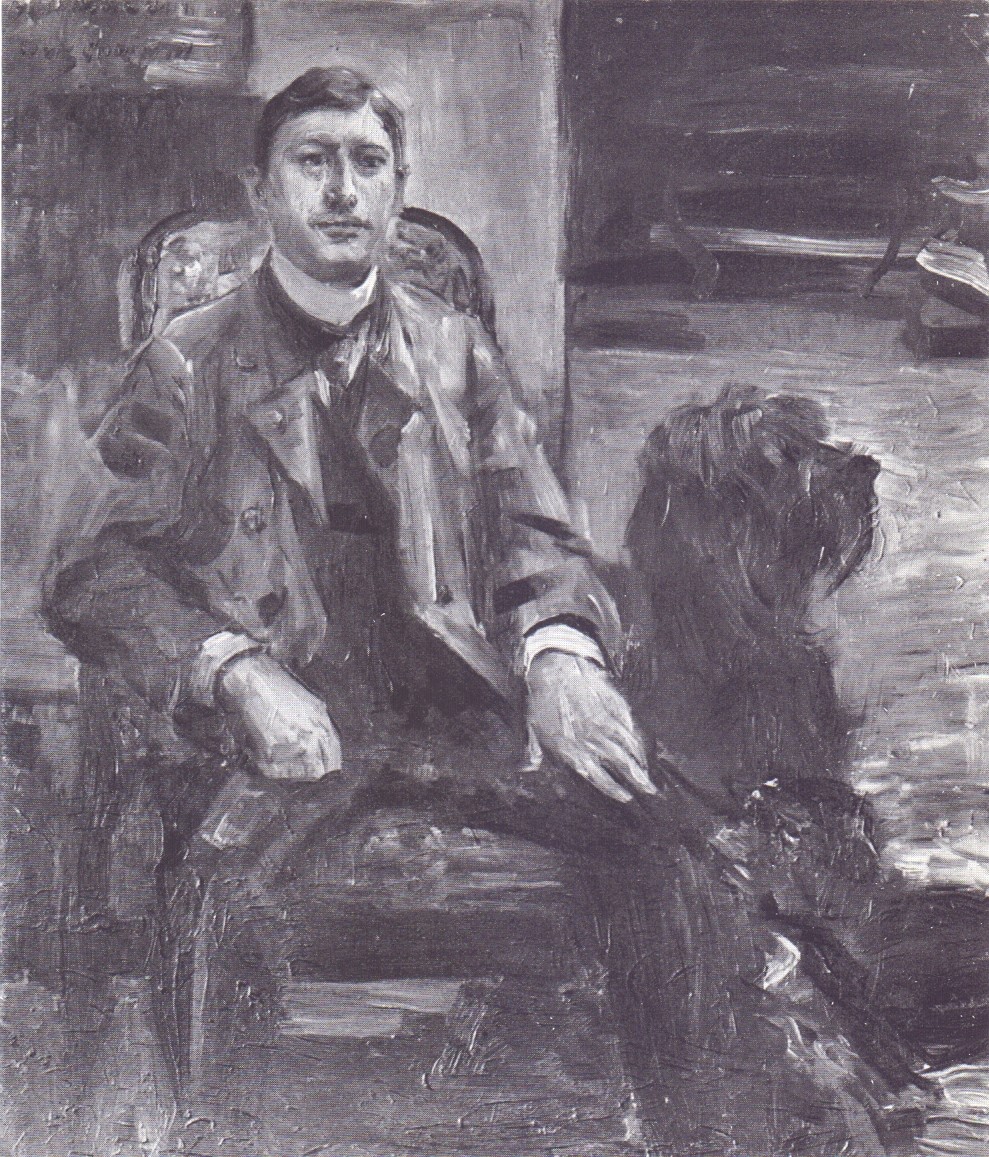
Oskar Moll was a German post-impressionist painter.
He studied painting in Munich and Berlin, met Henri Matisse in Paris in 1907 and took part in the founding of the Matisse Academy. He later taught at the Art Academy in Düsseldorf, from where he was eventually fired and branded as a propagator of degenerate art, one of his exhibitions was also banned by the Nazis and his works confiscated.
In his paintings, Moll combined linear structures with spaces of color, creating abstract and lyrical landscapes, still lifes and portraits. Contrasting color accents and ornamental motifs enliven the paintings.
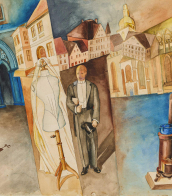

Oskar Moll was a German post-impressionist painter.
He studied painting in Munich and Berlin, met Henri Matisse in Paris in 1907 and took part in the founding of the Matisse Academy. He later taught at the Art Academy in Düsseldorf, from where he was eventually fired and branded as a propagator of degenerate art, one of his exhibitions was also banned by the Nazis and his works confiscated.
In his paintings, Moll combined linear structures with spaces of color, creating abstract and lyrical landscapes, still lifes and portraits. Contrasting color accents and ornamental motifs enliven the paintings.
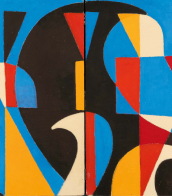

Oskar Moll was a German post-impressionist painter.
He studied painting in Munich and Berlin, met Henri Matisse in Paris in 1907 and took part in the founding of the Matisse Academy. He later taught at the Art Academy in Düsseldorf, from where he was eventually fired and branded as a propagator of degenerate art, one of his exhibitions was also banned by the Nazis and his works confiscated.
In his paintings, Moll combined linear structures with spaces of color, creating abstract and lyrical landscapes, still lifes and portraits. Contrasting color accents and ornamental motifs enliven the paintings.
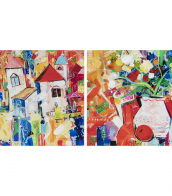

Oskar Moll was a German post-impressionist painter.
He studied painting in Munich and Berlin, met Henri Matisse in Paris in 1907 and took part in the founding of the Matisse Academy. He later taught at the Art Academy in Düsseldorf, from where he was eventually fired and branded as a propagator of degenerate art, one of his exhibitions was also banned by the Nazis and his works confiscated.
In his paintings, Moll combined linear structures with spaces of color, creating abstract and lyrical landscapes, still lifes and portraits. Contrasting color accents and ornamental motifs enliven the paintings.
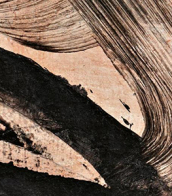

Oskar Moll was a German post-impressionist painter.
He studied painting in Munich and Berlin, met Henri Matisse in Paris in 1907 and took part in the founding of the Matisse Academy. He later taught at the Art Academy in Düsseldorf, from where he was eventually fired and branded as a propagator of degenerate art, one of his exhibitions was also banned by the Nazis and his works confiscated.
In his paintings, Moll combined linear structures with spaces of color, creating abstract and lyrical landscapes, still lifes and portraits. Contrasting color accents and ornamental motifs enliven the paintings.


Oskar Moll was a German post-impressionist painter.
He studied painting in Munich and Berlin, met Henri Matisse in Paris in 1907 and took part in the founding of the Matisse Academy. He later taught at the Art Academy in Düsseldorf, from where he was eventually fired and branded as a propagator of degenerate art, one of his exhibitions was also banned by the Nazis and his works confiscated.
In his paintings, Moll combined linear structures with spaces of color, creating abstract and lyrical landscapes, still lifes and portraits. Contrasting color accents and ornamental motifs enliven the paintings.


Oskar Moll was a German post-impressionist painter.
He studied painting in Munich and Berlin, met Henri Matisse in Paris in 1907 and took part in the founding of the Matisse Academy. He later taught at the Art Academy in Düsseldorf, from where he was eventually fired and branded as a propagator of degenerate art, one of his exhibitions was also banned by the Nazis and his works confiscated.
In his paintings, Moll combined linear structures with spaces of color, creating abstract and lyrical landscapes, still lifes and portraits. Contrasting color accents and ornamental motifs enliven the paintings.
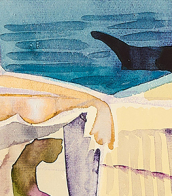

Oskar Moll was a German post-impressionist painter.
He studied painting in Munich and Berlin, met Henri Matisse in Paris in 1907 and took part in the founding of the Matisse Academy. He later taught at the Art Academy in Düsseldorf, from where he was eventually fired and branded as a propagator of degenerate art, one of his exhibitions was also banned by the Nazis and his works confiscated.
In his paintings, Moll combined linear structures with spaces of color, creating abstract and lyrical landscapes, still lifes and portraits. Contrasting color accents and ornamental motifs enliven the paintings.
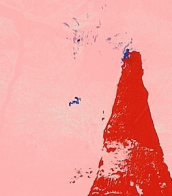

Oskar Moll was a German post-impressionist painter.
He studied painting in Munich and Berlin, met Henri Matisse in Paris in 1907 and took part in the founding of the Matisse Academy. He later taught at the Art Academy in Düsseldorf, from where he was eventually fired and branded as a propagator of degenerate art, one of his exhibitions was also banned by the Nazis and his works confiscated.
In his paintings, Moll combined linear structures with spaces of color, creating abstract and lyrical landscapes, still lifes and portraits. Contrasting color accents and ornamental motifs enliven the paintings.
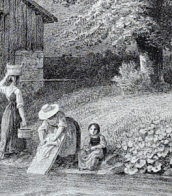

Oskar Moll was a German post-impressionist painter.
He studied painting in Munich and Berlin, met Henri Matisse in Paris in 1907 and took part in the founding of the Matisse Academy. He later taught at the Art Academy in Düsseldorf, from where he was eventually fired and branded as a propagator of degenerate art, one of his exhibitions was also banned by the Nazis and his works confiscated.
In his paintings, Moll combined linear structures with spaces of color, creating abstract and lyrical landscapes, still lifes and portraits. Contrasting color accents and ornamental motifs enliven the paintings.


Oskar Moll was a German post-impressionist painter.
He studied painting in Munich and Berlin, met Henri Matisse in Paris in 1907 and took part in the founding of the Matisse Academy. He later taught at the Art Academy in Düsseldorf, from where he was eventually fired and branded as a propagator of degenerate art, one of his exhibitions was also banned by the Nazis and his works confiscated.
In his paintings, Moll combined linear structures with spaces of color, creating abstract and lyrical landscapes, still lifes and portraits. Contrasting color accents and ornamental motifs enliven the paintings.


Oskar Moll was a German post-impressionist painter.
He studied painting in Munich and Berlin, met Henri Matisse in Paris in 1907 and took part in the founding of the Matisse Academy. He later taught at the Art Academy in Düsseldorf, from where he was eventually fired and branded as a propagator of degenerate art, one of his exhibitions was also banned by the Nazis and his works confiscated.
In his paintings, Moll combined linear structures with spaces of color, creating abstract and lyrical landscapes, still lifes and portraits. Contrasting color accents and ornamental motifs enliven the paintings.
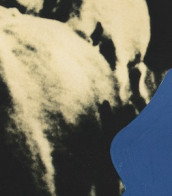

Oskar Moll was a German post-impressionist painter.
He studied painting in Munich and Berlin, met Henri Matisse in Paris in 1907 and took part in the founding of the Matisse Academy. He later taught at the Art Academy in Düsseldorf, from where he was eventually fired and branded as a propagator of degenerate art, one of his exhibitions was also banned by the Nazis and his works confiscated.
In his paintings, Moll combined linear structures with spaces of color, creating abstract and lyrical landscapes, still lifes and portraits. Contrasting color accents and ornamental motifs enliven the paintings.
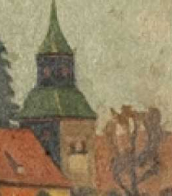

Oskar Moll was a German post-impressionist painter.
He studied painting in Munich and Berlin, met Henri Matisse in Paris in 1907 and took part in the founding of the Matisse Academy. He later taught at the Art Academy in Düsseldorf, from where he was eventually fired and branded as a propagator of degenerate art, one of his exhibitions was also banned by the Nazis and his works confiscated.
In his paintings, Moll combined linear structures with spaces of color, creating abstract and lyrical landscapes, still lifes and portraits. Contrasting color accents and ornamental motifs enliven the paintings.
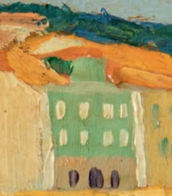

Oskar Moll was a German post-impressionist painter.
He studied painting in Munich and Berlin, met Henri Matisse in Paris in 1907 and took part in the founding of the Matisse Academy. He later taught at the Art Academy in Düsseldorf, from where he was eventually fired and branded as a propagator of degenerate art, one of his exhibitions was also banned by the Nazis and his works confiscated.
In his paintings, Moll combined linear structures with spaces of color, creating abstract and lyrical landscapes, still lifes and portraits. Contrasting color accents and ornamental motifs enliven the paintings.
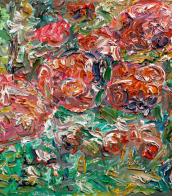

Oskar Moll was a German post-impressionist painter.
He studied painting in Munich and Berlin, met Henri Matisse in Paris in 1907 and took part in the founding of the Matisse Academy. He later taught at the Art Academy in Düsseldorf, from where he was eventually fired and branded as a propagator of degenerate art, one of his exhibitions was also banned by the Nazis and his works confiscated.
In his paintings, Moll combined linear structures with spaces of color, creating abstract and lyrical landscapes, still lifes and portraits. Contrasting color accents and ornamental motifs enliven the paintings.
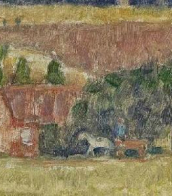

Oskar Moll was a German post-impressionist painter.
He studied painting in Munich and Berlin, met Henri Matisse in Paris in 1907 and took part in the founding of the Matisse Academy. He later taught at the Art Academy in Düsseldorf, from where he was eventually fired and branded as a propagator of degenerate art, one of his exhibitions was also banned by the Nazis and his works confiscated.
In his paintings, Moll combined linear structures with spaces of color, creating abstract and lyrical landscapes, still lifes and portraits. Contrasting color accents and ornamental motifs enliven the paintings.
